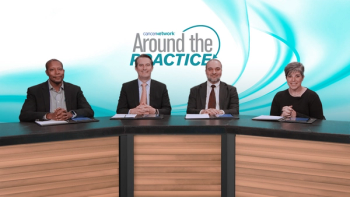
An overview of the evolving role of CAR-T therapy in patients with relapsed or refractory follicular lymphoma.

Your AI-Trained Oncology Knowledge Connection!


An overview of the evolving role of CAR-T therapy in patients with relapsed or refractory follicular lymphoma.

Charles A. Schiffer, MD, reviews clinical trial data for asciminib in chronic myeloid leukemia and highlights financial toxicity concerns.

The expert panel discusses the potential role of olverembatinib in the chronic myeloid leukemia treatment landscape.
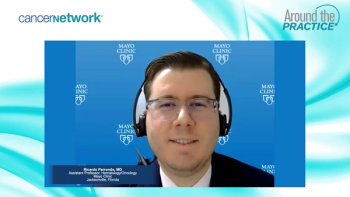
Medical expert discusses that when managing relapsed or refractory chronic lymphocytic leukemia, the goals are similar to first-line therapy, and he emphasizes using BCL-2 and BTK inhibitors, guided by factors such as previous therapies, patient preferences, and comorbidities.
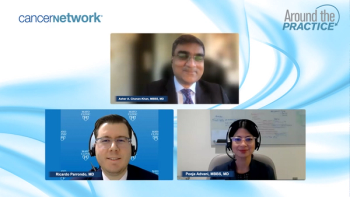
Experts discuss the management of a patient with chronic lymphocytic leukemia who experienced adverse effects such as joint pain and atrial fibrillation while on treatment with ibrutinib, emphasizing the role of cardio-oncology and considering a switch to a second-generation BTK inhibitor for better safety and fewer drug interactions.
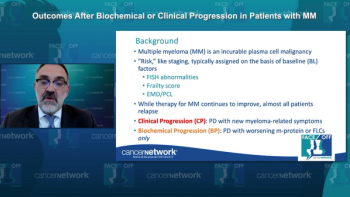
Jeffrey A. Zonder, MD, reviews data on patient outcomes following biochemical or clinical progression in multiple myeloma.

The expert panel discusses the efficacy and durability of response of ciltacabtagene autoleucel in patients with multiple myeloma.
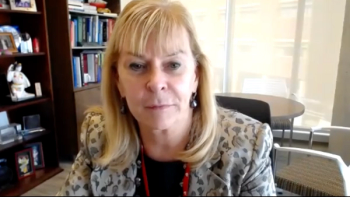
Dose adjustments and alternative treatment regimens may be required amid hematologic drug shortages.
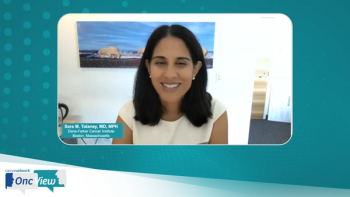
Sara M. Tolaney, MD, MPH, concludes the program with advice for community oncologists who are treating patients with breast cancer.

Findings from recent studies support the use of artificial intelligence-based tools in the context of radiation therapy for patients with localized prostate cancer, according to Neeraj Agarwal, MD.

Julie M. Vose, MD, MBA, reflects on the generic drug shortages and the reasoning behind the continued pattern affecting different cancer types.

Misako Nagasaka, MD, PhD, and Kristen Neumann, DNP, FNP-C, discuss the importance of early dermatological consultations and multidisciplinary education for managing infusion-related adverse events like rashes from amivantamab, emphasizing the benefits of a well-coordinated team and the value of experience in responding to reactions.
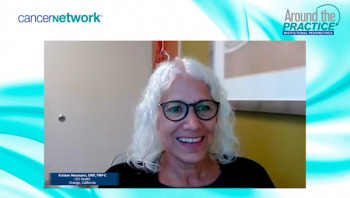
Kristen Neumann, DNP, FNP-C, emphasizes the efficacy of the drug amivantamab for patients with EGFR exon 20 mutations, explaining the challenges of unique skin rashes, but highlighting the importance of teamwork in effectively managing and treating these adverse skin effects.

Panelists review the previously presented patient case and discuss alternative treatment strategies in early disease progression with expert insight on preferred treatment approaches for this setting.

Expert oncologists discuss best practices surrounding treatment follow-up and monitoring for patients with relapsed or refractory follicular lymphoma.

Moaath Mustafa Ali, MD, MPH, reviews data on olverembatinib in patients with heavily pretreated/refractory chronic myeloid leukemia.

Resolving disparities within the blood cancer space is a matter of “access to excellent healthcare,” according to Usama Gergis, MD, MBA.
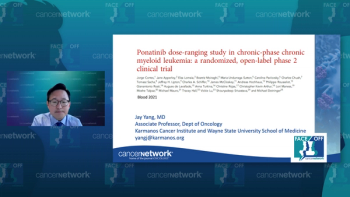
Expert perspectives on treatment considerations for ponatinib in patients with chronic myeloid leukemia.

Key opinion leaders detail strategies for patients with chronic lymphocytic leukemia relapsing after fixed-duration BTK and BCL2 inhibitor treatment, emphasizing the importance of genetic testing for mutations that could render them resistant to a re-challenge and considering third-generation BTK inhibitors if mutations are found.

Jack Khouri, MD, discusses phase 3 results from the CARTITUDE-4 study investigating ciltacabtagene autoleucel in patients with lenalidomide-refractory multiple myeloma.

Following a review of data from the ALLIANCE A061202 study, experts on multiple myeloma discuss treatment considerations for patients being treated with ixazomib, pomalidomide, and dexamethasone.

Ricardo Parrondo, MD, discusses the potential of combining BTK and BCL2 inhibitors in chronic lymphocytic leukemia treatment, emphasizing their synergistic effect and cautioning against use in frail patients or those with cardiovascular comorbidities, while Pooja Advani, MBBS, MD, stresses the importance of medical history and risk stratification, especially regarding cardiovascular adverse effects.

A breast oncologist looks to the future of breast cancer treatment and discusses emerging therapies and ongoing clinical trials.

Expert perspectives on the treatment landscape for triple-negative breast cancer and the evolving role of immunotherapy in this space.
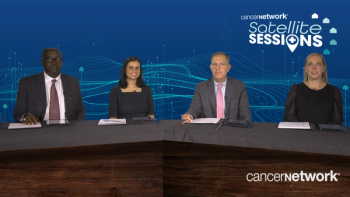
Concluding their comprehensive discussion on treating patients with multiple myeloma, the expert panel discusses unmet needs and looks to the future of treatment.

The panel presents the case of a 68-year-old man with multiple myeloma and offers their initial impressions.

Hypofractionated radiotherapy yields less financial toxicity than conventionally fractionated radiotherapy in patients with breast cancer who have undergone reconstruction following mastectomy.

Discrepancies in patients with blood cancer who are eligible for but do not undergo hematopoietic stem cell transplant have been observed not only for Black patients, but Hispanic, Asian, and White patients as well, according to Usama Gergis, MD, MBA.

Germline testing may elucidate important mutations in patients with metastatic prostate cancer who may be eligible to receive treatment with PARP inhibitors, according to Neeraj Agarwal, MD.

Kristen Neumann, DNP, FNP-C, highlights the value of a multidisciplinary approach in the care of patients with EGFR-mutated non-small cell lung cancer, emphasizing the roles of dermatologists, pharmacists, and nurses in ensuring thorough patient assessment and education; Misako Nagasaka, MD, PhD, highlights data from WCLC 2023 on osimertinib in EGFR-mutated NSCLC.